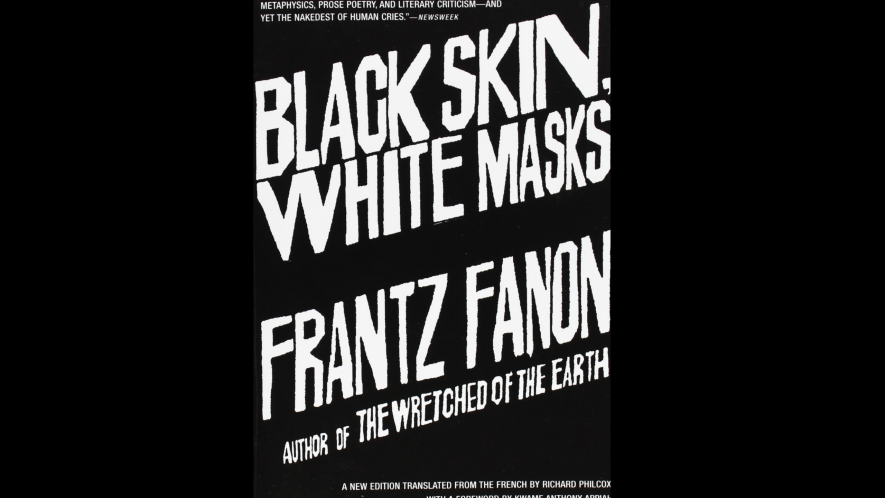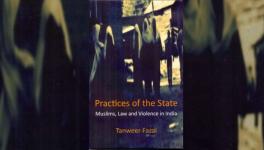Relook at a Book: ‘Black Skin White Masks’, an Inspiration for Black Movement

Image Courtesy: Amazon.in
Who is Frantz Fanon? He is one of the foremost revolutionary thinkers from Africa and the Caribbean. He was born in Martinique, still under French control, but remained an active part of the revolutionary liberation struggle against French colonialism. Professionally he was a trained doctor of psychiatry and wrote a doctoral thesis in France on the subject. He was the son of an African origin father and an Afro-Martinican white origin mother.
During his schooling in Martinique, he came under influence of his teacher, French poet and writer Aime Cesair. Born in 1925, Fanon lived for just 36 years, dying in 1961. He left Martinique at the age of 18 years and received his higher education from University of Lyons in France. He was influenced by Marxism. While studying medicine and psychiatry at University of Lyons, he also attended lectures on literature, drama, and philosophy by French philosopher Merleau Ponty.
While studying he wrote three plays, of which two survive. He joined FLN -- the anti-colonial Algerian liberation front, fighting against French colonialism. He practiced as a psychiatrist, and from his experiences, he wrote his first book at the age of 27, in 1952 -- Black Skin White Masks. It was his doctoral thesis, but he submitted the thesis with some variation and published this as a book. He was detected as suffering from leukaemia, yet he continued working and just before his death, his most famous work -- The Wretched of the Earth was published with an introduction by author-philosopher Jean Paul Sartre.
Fanon was impressed by Sartre’s support to the Algerian liberation war. Fanon served as the Ambassador to Ghana of provisional Government of Algeria and on its behalf attended many conferences in African countries. In 1959, his book, The Dyeing Colonialism, was published and in 1961, his magnum opus The Wretched of the Earth was published. Two collections of his shorter writings were published posthumously- Towards the African Revolution in 1964 and Alienation and Freedom in 2018.
All his books have been translated into English. Black Skin White Masks, since its first publication, is considered a seminal book; two post-modernist thinkers -- Indian scholar Homi K Bhabha and British-Pakistani scholar Ziauddin Sardar -- wrote forewords to the book. Its English translation was done by Charles Lam Markmaan in 1967 and was published by Groove Press. Bhabha wrote the foreword in the 1986 edition and Sardar in 2008 edition by Pluto Press London.
Sardar in his foreword explains the theme of the book as -- “It is the anger of all whose cultures, knowledge systems and ways of being that are ridiculed, demonized, declared inferior and irrational, and, in some cases, eliminated.”
He further adds that while fighting against Nazi Germany from the Free France side, serving in the military, Fanon experienced racism on a daily basis. In France, he noticed that French women avoided black soldiers who were sacrificing their lives to liberate them. He was wounded; and was awarded the Croix de Guerre for bravery during his service in the Free French forces.
After the war against Nazi Germany was over, Fanon won a scholarship to study medicine and psychiatry at Lyon. After completing his doctorate, in 1953, he was offered a job as head of the psychiatric department of Bilda- Joinville Hospital in Algiers and he jumped at the opportunity.
In Algeria a full-blown liberation struggle was going on and Fanon joined the National Liberation Front (FLN) after leaving the job in 1956. The French response was brutal. Sardar writes with sorrow that Fanon did not live to see Algeria gain full independence.
While in Ghana, Fanon was diagnosed with leukaemia. He was taken to the United States for treatment, but died there in Washington on December 6, 1961. Yet, his most influential work, The Wretched of the Earth, with the foreword by Sartre, was published before his death, which became an inspiration for the black movement throughout the world. US Black Power or Black Panthers movement was influenced by Fanon’s classic book.
As per Sardar: “Black Skin, White Masks was the first book to investigate the psychology of colonialism. It examines how colonialism is internalized by the colonized, how an inferiority complex is inculcated, and how, through the mechanism of racism, black people end up emulating their oppressors.” Sardar also quotes Indian scholar Ashish Nandy in support of his argument. Kenyan writer/scholar Ngugi WaThiongo’s book ‘Decolonizing the Mind’ was also influenced by Black Skin White Masks.
In his long foreword in 1986 edition, Indian scholar Homi K Bhabha introduces the post-modernist interpretation of Black Skin White Masks, which becomes more tedious to read than even the book, which has a complex subject, but can be understood better without the post-modernist forewords. Homi K Bhabha writes in his foreword, ‘Whenever questions of race and sexuality make their own organizational and theoretical demands on the primacy of “class,” “state” and “party” the language of traditional socialism is quick to describe those urgent, “other” questions as symptoms of petty-bourgeois deviation, signs of the bad faith of socialist intellectuals. The ritual respect accorded to the name of Fanon, the currency of his titles in the common language of liberation, are part of the ceremony of a polite, English refusal.”
He further says, “Fanon attempts such audacious, often impossible, transformations of truth and value, the jagged testimony of colonial dislocation, its displacement of time and person, its defilement of culture and territory, refuses the ambition of any “total” theory of colonial oppression.”
Moving straight to the book, Fanon in his short introduction begins with a quote from his beloved teacher:
“I am talking of millions of men who have been skillfully injected with fear, inferiority complexes, trepidation, servility, despair, abasement.”
—Aimé Césaire, Discours sur le Colonialisme
Unlike his scientific subject, Fanon begins in a bit emotional poetic introduction as he explains the reason for writing this book-
“Why write this book? No one has asked me for it. Especially those to whom it is directed. Well? Well, I reply quite calmly that there are too many idiots in this world. And having said it, I have the burden of proving it. Toward a new humanism. . . . Understanding among men. . . . Our colored brothers. . . . Mankind, I believe in you. . . . Race prejudice. . . . To understand and to love. . . .”
In an anguished tone at the young age of about 25, he further poses the questions-
“What does a man want?
What does the black man want?
At the risk of arousing the resentment of my colored brothers,
I will say that the black is not a man.”
The task of the author, who is a professional psychiatrist, is to explain Black-White relations; he says:
“The white man is sealed in his whiteness.
The black man in his blackness.
We shall seek to ascertain the directions of this dual narcissism
and the motivations that inspire it.”
From his experiences in treating patients, the author gets the raw data, which is problematic:
“There is a fact: White men consider themselves superior to black men.
There is another fact: Black men want to prove to white men, at all costs, the richness of their thought, the equal value of their intellect. How do we extricate ourselves?
A moment ago, I spoke of narcissism. Indeed, I believe that only a psychoanalytical interpretation of the black problem can lay bare the anomalies of affect that are responsible for the structure of the complex.”
One can see that the author is better able to explain the complexity of his subject than his post-modernist interpreters, who by their theoretical jargon, make the book look more complex than it actually is. The author explains the theme of the book rather clearly when he says --
‘This book is a clinical study. Those who recognize themselves in it, I think, will have made a step forward. I seriously hope to persuade my brother, whether black or white, to tear off with all his strength the shameful livery put together by centuries of incomprehension.’
Fanon goes on to describe the chapterisation of the book like a researcher. In fact, the book initially was supposed to be Fanon’s doctoral thesis, which later he changed to book format, while he submitted the thesis in a different format.
The first three chapters contain the concept and features of the Negro and later chapters take up some case studies. So, he begins the first chapter as ‘The Negro and Language’. Unconsciously or subconsciously, Negroes are natives of any colonised country in Asia or Africa; while fighting the colonial masters and getting rid of them, they try to acquire the competence in the colonial master’s language imposed upon them through administration or the education system. Fanon has discussed this trend in context of Africa, which was colonized more by the French with established hegemony of French language in the colonies. But the same is true of British colonies.
As Fanon talks about Algerian or Martinican Negroes getting mentally enslaved by the French, so has Ngũgĩ, from the British colony of Kenya, discussed in Decolonizing the Mind. In fact, Ngũgĩ changed even his Christian name James to Thiong’o wa and went back to his mother tongue Gikuyu for his creative writing, while as a Professor of Comparative Literature, he uses English for his academic writings.
Fanon is critical of those liberals who say that Negroes should be treated ‘kindly’, in a way that they pity them and make them devoid of human dignity of equality. Fanon says at one place, “What I am asserting is that the European has a fixed concept of the Negro, and there is nothing more exasperating than to be asked: “How long have you been in France? You speak French so well.”
In other words, it implies the Negro has got civilised and cultured by speaking a colonial language ‘so well’, and thus psychologically expressing the ‘superiority’ of the ‘white’!
In India, there were examples of public school educated children who were asked to speak English even in their homes and adopt an ‘accent’, say, British or American, whereas the natural accent with a Bengali, South Indian or North Indian touch is mocked, even if the written language of such persons may better than a British or American.
Fanon observes the bitter reality that “To speak a language is to take on a world, a culture. The Antilles Negro who wants to be white will be the whiter as he gains greater mastery of the cultural tool that language is.” Fanon elaborates it further: “Historically, it must be understood that the Negro wants to speak French because it is the key that can open doors which were still barred to him fifty years ago.” Compare this with the one section among the dalit movement pleading for English as a medium and source to become part of the elite and corporate sector in India. Our old Leftist dalit intellectual Chandra Bhan Prasad is a votary of this trend.
In the second chapter, Fanon moves to a more complex subject of ‘The Woman of Colour and the White Man’. Men and women, both Whites and Blacks, get attracted to each other, sometime marry too, but somehow their mental complexes come in the way of loving each other as two free human beings without any complex of colour or race. Both have a sense of superiority and inferiority and narcissism, which reflects upon their sexual relationship as well.
The third chapter title is the reversal of the second chapter -- ‘The Man of Colour and the White Woman’. As a practising psychiatrist, Fanon observes features of complexity in emotional and physical relations of both sexes culturally shaped by the sense of colour, even when they are intellectually advanced and sometimes progressive. The cultural, emotional and psychological fallout of such situations are described by Fanon in these words: “We know historically that the Negro guilty of lying with a white woman is castrated. The Negro who has had a white woman makes himself taboo to his fellows.” There are many case studies by Fanon, but his conclusion is - “We shall see that another solution is possible. It implies a restructuring of the world.” So, how to restructure the world in a non-racial, non-casteist, non-discriminatory manner?
In the fourth chapter with the title- ‘The So-called Dependency Complex of the Colonized Peoples’, Fanon debates this issue with another scholar, Mannoni, author of The Psychology of Colonization, and rebuts his arguments. Taking the example of South Africa, he says, “What is South Africa? A boiler into which thirteen million blacks are clubbed and penned in by two and a half million whites. If the poor whites hate the Negroes, it is not, as M. Mannoni would have us believe, because “racialism is the work of petty officials, small traders, and colonials who have toiled much without great success.” No; it is because the structure of South Africa is a racist structure.”
Moving further, Fanon discusses ‘The Fact of Blackness’. He reacts to others defining what a Negro is in their own definitions, to which he responds: “For my own part, I would certainly know how to react. And in one sense, if I were asked for a definition of myself, I would say that I am one who waits; I investigate my surroundings, I interpret everything in terms of what I discover, I become sensitive.” In this chapter, Fanon quotes many poems to describe the complex feelings involved even in matters of sexual relationships.
In the sixth chapter , ‘The Negro and Psychopathology’, Fanon presents a brief but deep psychoanalyses of colonised black people, and the inability of black people to fit into the norms (social, cultural, racial) established by white society (the coloniser). That "a normal Negro child, having grown up in a normal Negro family, will become abnormal on the slightest contact of the white world.” In next chapter, ‘The Negro and Recognition’, Fanon goes further deep in describing Negroes. After discussing Adler, in sub section of this chapter , ‘The Black Man and Hegel’, he examines the dialectics of the philosopher and conveys his suspicions of the black man being under the rubric of a philosophy modelled after whiteness. According to Fanon, there is a conflict that takes form internally as self-deprecation because of this white philosophical affirmation.
In last chapter, ‘By Way of Conclusion’, Fanon opines that both Blacks and Whites are torn due to the historical past of racialism and for creating a new society. He concludes the book with these words:
“It is through the lasting tension of their freedom that men will be able to create the ideal conditions of existence for a human world. Superiority? Inferiority? Why not the quite simple attempt to touch the other, to feel the other, to explain the other to myself? Was my freedom not given to me then in order to build the world of the you? At the conclusion of this study, I want the world to recognize, with me, the open door of every consciousness. My final prayer: O my body, make of me always a man who questions!
In India, too, we need to build a society where there are people who question. The weak tradition of questioning is being suppressed by the cult of Bhakti, rather Andh Bhakti (Blind Faith), against which Dr BR Ambedkar, another victim of casteism, like racialism in Africa, opined that questioning was the biggest asset of mankind and the society that stops questioning was doomed to go back to barbarism. Bhagat Singh too wrote ‘Why I am an Atheist’ by questioning every phenomenon around him.
The first step of liberation for ‘The Wretched of the Earth’, the last and classic book of Frantz Fanon, lies in his first book ‘Black Skins and White Masks’ -
“ O my body, make of me always a man who questions!”
The writer is a retired professor of JNU and an honorary adviser to the Bhagat Singh Archives and Resource Centre, Delhi. Views are personal.
Get the latest reports & analysis with people's perspective on Protests, movements & deep analytical videos, discussions of the current affairs in your Telegram app. Subscribe to NewsClick's Telegram channel & get Real-Time updates on stories, as they get published on our website.
























